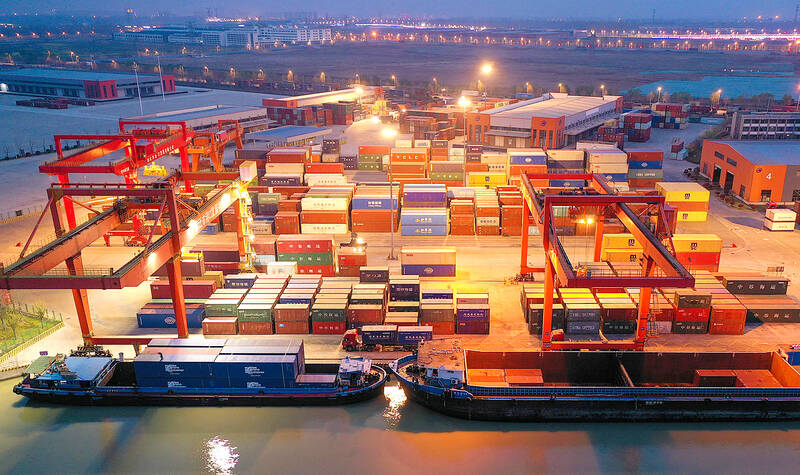Profits at industrial firms in China plunged in the first two months of this year as factories had yet to fully recover from a COVID-19-induced slump and prices continued to decline.
Industrial profits in the January-to-February period dropped 22.9 percent from a year earlier, the Chinese National Bureau of Statistics said yesterday.
For the entirety of last year, profits declined 4 percent from the previous year.

Photo: AFP
“Even though industrial production rebounded, market demand hadn’t recovered completely,” bureau statistician Sun Xiao (孫曉) said in a statement accompanying the data.
The decline in revenue was greater than the drop in costs, weighing on gross corporate profits, Sun added.
Foreign firms continued to lag behind others, with profits plummeting 35.7 percent in the first two months from the same time a year earlier. Profits fell 9.5 percent for all of last year.
At private firms, profits fell 19.9 percent in the January-to-February period, while those at state-owned enterprises declined 17.5 percent.
The plunge in profits came despite data earlier this month showing that industrial output rebounded in the first two months of the year to 2.4 percent after COVID-19 restrictions were scrapped and as a wave of infections subsided.
However, producer deflation deepened last month as commodity costs softened, a sign that some factories are cutting prices, resulting in falling revenue and smaller profits.
“Firms were not able to pass on the higher costs to downstream users as demand has yet to recover fully,” Societe Generale SA greater China economist Michelle Lam (林雪潔) said.
Yesterday marked the first time China reported profit data this year. The first two months of the year are typically combined to account for distortion effects because of the Lunar New Year holiday, which can fall in either month. Officials have not released single-month data for profits since June last year.
The economic recovery still faces headwinds from higher-than-expected unemployment and a continued slump in real-estate investment — as well as an uncertain global environment that might weigh on demand for Chinese exports, which are already under pressure.
While China’s industrial production will “rebound,” Australia and New Zealand Banking Group Ltd senior China strategist Xing Zhaopeng (邢兆鵬) said. “The prices will continue to be impacted by global central banks’ tightening monetary policies.”
The decline in industrial profit growth is expected to “narrow markedly going forward,” Xing added.

To many, Tatu City on the outskirts of Nairobi looks like a success. The first city entirely built by a private company to be operational in east Africa, with about 25,000 people living and working there, it accounts for about two-thirds of all foreign investment in Kenya. Its low-tax status has attracted more than 100 businesses including Heineken, coffee brand Dormans, and the biggest call-center and cold-chain transport firms in the region. However, to some local politicians, Tatu City has looked more like a target for extortion. A parade of governors have demanded land worth millions of dollars in exchange

Hong Kong authorities ramped up sales of the local dollar as the greenback’s slide threatened the foreign-exchange peg. The Hong Kong Monetary Authority (HKMA) sold a record HK$60.5 billion (US$7.8 billion) of the city’s currency, according to an alert sent on its Bloomberg page yesterday in Asia, after it tested the upper end of its trading band. That added to the HK$56.1 billion of sales versus the greenback since Friday. The rapid intervention signals efforts from the city’s authorities to limit the local currency’s moves within its HK$7.75 to HK$7.85 per US dollar trading band. Heavy sales of the local dollar by

Taiwan Semiconductor Manufacturing Co’s (TSMC, 台積電) revenue jumped 48 percent last month, underscoring how electronics firms scrambled to acquire essential components before global tariffs took effect. The main chipmaker for Apple Inc and Nvidia Corp reported monthly sales of NT$349.6 billion (US$11.6 billion). That compares with the average analysts’ estimate for a 38 percent rise in second-quarter revenue. US President Donald Trump’s trade war is prompting economists to retool GDP forecasts worldwide, casting doubt over the outlook for everything from iPhone demand to computing and datacenter construction. However, TSMC — a barometer for global tech spending given its central role in the

An Indonesian animated movie is smashing regional box office records and could be set for wider success as it prepares to open beyond the Southeast Asian archipelago’s silver screens. Jumbo — a film based on the adventures of main character, Don, a large orphaned Indonesian boy facing bullying at school — last month became the highest-grossing Southeast Asian animated film, raking in more than US$8 million. Released at the end of March to coincide with the Eid holidays after the Islamic fasting month of Ramadan, the movie has hit 8 million ticket sales, the third-highest in Indonesian cinema history, Film